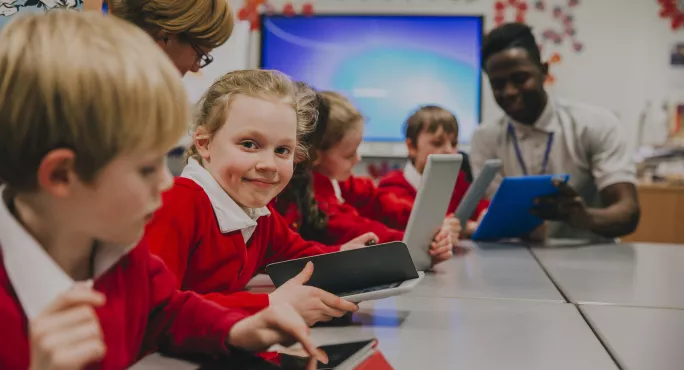What is writing?
Is it determined by the chosen tool of the author? For example, the pressing of shapes into clay? The carving of symbols into stone? Might it be brush strokes, markings from a quill or attractive, slanted, cursive letter formation on lined paper? Or could it be the spoken word, printed digitally?
Writing is the composing of text. That sounds straightforward enough. Yet the act of teaching writing is anything but simple. Letter formation, pencil grip, letter spacing, spelling, sentence structure, word choice, punctuation, grammar - it is the most complex of tasks.
But now we can make it easier. Six years ago, I attended a seminar led by CALL Scotland - which helps children and young people across Scotland to overcome disability and barriers to learning - that pointed teachers toward technological support for helping these children.
Emerging from a period of remote learning - and with schools moving towards 1:1 devices in the classroom - assistive technology for writing is no longer inaccessible or convoluted. It is, in fact, readily available, accurate and remarkably intuitive.
Covid: What has happened to handwriting in lockdown?
Blair Minchin podcast interview: ‘Teachers have a duty to share their great ideas’
Research: Lack of edtech data on helping pupils with disabilities
Remote learning: 8 great online teaching tools you may have missed
Writing: Pupils ‘don’t know how to hold a pencil’
Technology: Could Alexa ever take the place of a teacher?
I have begun to use the notes app on iPad (it comes preloaded as standard) to assist my pupils in writing lessons. The dictation tool allows pupils to speak the words and punctuation into a document that can then be airdropped and printed from our “teacher” iPad. The mark-up tool even allows pupils to quickly and painlessly create colourful pictures to accompany their work. They can also insert photos from the internet or the classroom with a couple of taps of their fingers.
The results have been truly astounding. Pupils that would work hard to scrawl one or two lines of text in a 45-minute writing session are now producing two paragraphs of well structured writing in 10 minutes.
Moreover, with the mechanics of writing greatly reduced, there is far more time for pupils to spend on word choice, phrasing and editing their work. The learning intention and success criteria become the sole focus, not the act of getting legible letters on a page. A former pupil of mine once said that “to write is to fly on your imagination” - of course, in true primary teacher style, I made this into a motivational quote with Canva and stuck it above my desk.
However, for many children, our educational norms and the reticence to embrace technology lead to their wings being clipped. Our traditional tool of choice for writing, the pencil, can lead to struggle, fear and demoralisation. But we can change this.
I’ve observed many benefits of using speech-to-text technology but there is one discernible outcome in the classroom that I’ve seen more than any other: smiles.
Blair Minchin is a primary teacher in Edinburgh. He tweets @Mr_Minchin




